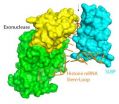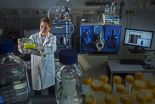(Press-News.org) Using data collected about Labrador Retrievers, research published in BioMed Central's open access journal BMC Veterinary Research is beginning to quantify the health, illnesses, and veterinary care of dogs.
The UK is a nation of pet lovers – but what do we know about the health of our pets? To date the long term (longitudinal) study of canine diseases has been patchy, relying on information from referral centers and details about pet illnesses which are not reported to a vet have never been studied before.
The Dogslife internet-based project was organized in conjunction with the Kennel Club. From the 1st July 2010 the owners of all Labrador Retrievers born after 1st January 2010 and registered with the Kennel Club were invited to be part of the project. In the first year of the study 1407 dogs were enrolled in the study.
Early results to come out of this study show that four out of ten of all dogs were ill at some point. Analyzing their data the researchers estimated that about 80% of dogs had been ill by the time they were one year old – but that only half were considered by their owners to be ill enough to need to visit the vet.
Discussing the Dogslife project, Dr Dylan Clements from the Royal (Dick) School of Veterinary Studies and The Roslin Institute, which are both part of The University of Edinburgh, and lead author of the study said, "Labrador Retrievers are the most popular pedigree dog in the UK, and breeders and owners are passionate about the health of their pets. We are extremely grateful for the time and commitment provided by owners and breeders contributing to the study. We hope to follow the health of these dogs throughout their lives so that we can identify aspects of care which might reduce the risk of dogs developing disease in the future."
###
Media Contact
Dr Hilary Glover
Scientific Press Officer
BioMed Central
Mob: 44-778-698-1967
Notes
The study is on-going, so any Kennel Club registered Labradors born in the UK after 1st January 2010 can join the project.
1. Dogslife: A web-based longitudinal study of Labrador Retriever health in the UK
Dylan N Clements, Ian G Handel, Erica Rose, Damon Querry, Carys A Pugh, William ER Ollier, Kenton L Morgan, Lorna J Kennedy, Jeffery Sampson, Kim M Summers and B Mark de Bronsvoort
BMC Veterinary Research (in press)
Please name the journal in any story you write. If you are writing for the web, please link to the article. All articles are available free of charge, according to BioMed Central's open access policy.
Article citation and URL available on request on the day of publication.
Please credit "Dogslifestudy" images to "(c) Callum Bennetts - Maverick Photo Agency"
2. BMC Veterinary Research is an open access, peer-reviewed journal that considers articles on all aspects of veterinary science and medicine, including the epidemiology, diagnosis, prevention and treatment of medical conditions of domestic, companion, farm and wild animals, as well as the biomedical processes that underlie their health.
3. BioMed Central is an STM (Science, Technology and Medicine) publisher which has pioneered the open access publishing model. All peer-reviewed research articles published by BioMed Central are made immediately and freely accessible online, and are licensed to allow redistribution and reuse. BioMed Central is part of Springer Science+Business Media, a leading global publisher in the STM sector. @BioMedCentral END
The dwindling reserves of fuelwood in Africa have been illuminated in a new study published today, which shows a bleak outlook for supplies across savannas in South Africa.
Presenting their findings in IOP Publishing's journal Environmental Research Letters, researchers have found that at current consumption levels in the communal areas of Lowveld, South Africa, reserves of fuelwood could be totally exhausted within 13 years.
The consequences are significant, with around half of the 2.4 million rural households in the country using wood as their primary fuel source, ...
(Embargoed) CHAPEL HILL, N.C. – Histone proteins are the proteins that package DNA into chromosomes. Every time the cell replicates its DNA it must make large amounts of newly made histones to organize DNA within the nucleus.
An imbalance in the production of DNA and histones is usually lethal for the cell, which is why the levels of the messenger RNA (mRNA) encoding the histone proteins must be tightly controlled to ensure the proper amounts of histones (not too many and not too few) are made.
In a collaborative effort published online in the January 18, 2013 issue ...
WINSTON-SALEM, N.C. – Jan. 17, 2013 – Farmworkers are at potential risk from food and waterborne illnesses because of the condition of cooking and eating facilities available to them, according to a new study from Wake Forest Baptist Medical Center.
Researchers from Wake Forest Baptist are the first to evaluate cooking and eating facilities in migrant farmworker camps to compare against established housing regulations. They found that the facilities fail to comply with regulations in a substantial number of camps. The study, which appears online today in the January issue ...
In contrast to climate change, there is no coordinated global system in place for measuring and reporting on biodiversity change or loss. An international team of biologists is now addressing this gap.
In Science today, 30 researchers led by Henrique Miguel Pereira, from the Centre for Environmental Biology of the University of Lisbon, proposed a global biodiversity monitoring system based on a set of essential variables.
By determining the most essential measurements to accurately and usefully report on biodiversity loss, known as essential biodiversity variables (EBVs), ...
Scientists from The University of Manchester have discovered that weight loss plays an important role in the body's response to fighting off intestinal worms.
The findings have been published in the journal PLOS Pathogens and show that the immune system hijacks the natural feeding pathways causing weight loss. This then drives the defense mechanisms down the correct pathway to expel the worms.
Nearly one quarter of the world's population is infected with gastrointestinal parasites. These prevalent infections often result in a period of reduced appetite resulting in ...
This press release is available in German.
Immune cells constantly patrol our body to check for foreign invaders, such as bacteria or viruses. To do so they leave the blood stream, actively crawl through tissues and finally re-enter the circulation via lymphatic vessels. Research from the laboratory of Michael Sixt elucidates how the cells are guided through tissues like the skin. It is thought that cells either sense their environment by 'touching' or 'smelling': They adhere to structural molecules like connective tissue proteins using adhesion receptors. Or ...
Gas separation is crucial for many industrial processes including obtaining nitrogen or oxygen from air and purifying natural gas or hydrogen. Currently, the most energy efficient method for separating gases involves polymer membranes, however, most polymers either let gases pass through slowly (i.e. have low permeability) or are not selective towards one gas over another. Gas separation would be cheaper and use less energy if polymer membranes could be made both highly permeable and selective.
A team from the University's School of Chemistry reports in the journal Science ...
This press release is available in German.
Toronto -- Early life exposure to normal bacteria of the GI tract (gut microbes) protects against autoimmune disease in mice, according to research published on-line in the January 17 edition of Science. The study may also have uncovered reasons why females are at greater risk of autoimmune diseases such as multiple sclerosis, rheumatoid arthritis, and lupus compared to males.
Researchers from The Hospital for Sick Children (SickKids) found that when female mice at high risk of autoimmune (type 1) diabetes were exposed ...
(Edmonton) Almost 100 years after the initial discovery, a team of scientists at the University of Alberta and the National Institute for Nanotechnology in Edmonton have harnessed the Barkhausen Effect as a new kind of high-resolution microscopy for the insides of magnetic materials.
The researchers say the technique has the potential to provide critical information as a rapid prototyper for magnetic computational devices that expand the role of magnetism within computers.
In 1919, Barkhausen discovered the first evidence of magnetic domains (patterns in how the directions ...
Spending on energy efficiency programs funded by electric and natural gas utility customers will double by 2025 to about $9.5 billion per year, according to projections published today by researchers at Lawrence Berkeley National Laboratory (Berkeley Lab).
These funds, which come from a charge on utility bills, historically constitute the nation's largest source of spending on programs to foster the adoption of more efficient products and buildings. According to the Berkeley Lab report, energy efficiency programs funded by utility customers are projected to continue ...



